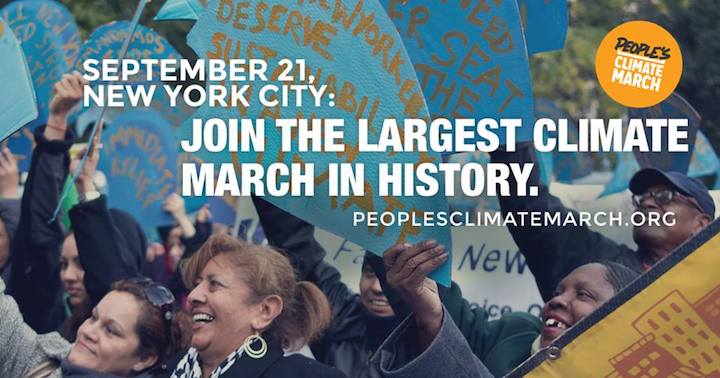Today people are coming together around the globe to march on climate change. I’ll be marching as well, not in spite of my faith but because of it.
In a number of posts here, I’ve argued that a solid theology of creation and of the resurrection means that Christians should be concerned about climate change. To care for God’s creation is a fundamental act of Christian discipleship. There may be no “blessed are the tree planters” in the Sermon on the Mount, but Jesus died and rose again to bear God’s image in a way no one else could.
Jesus as risen Lord shows forth God’s image to the whole of creation.
If Christians do not participate in such marches, we lose the opportunity to show our solidarity with all those concerned about the future of our planet, and to witness to them from a fundamentally Christian perspective.
The writer to the Hebrews tells us that we are yet to fully enter into the rest that Christ has made open to us (Hebrews 4). In a sense, we are still in exile. As Paul reminds us in Romans 8 (verses 19-23), both the children of God and the whole creation groaning in birth pains await their Exodus, their entry into rest.
Creation longs for this because it will mean freedom from decay and bondage under human misrule. Paul did not write about this in the abstract. He would have witnessed the environmental destruction of his day, including the spread of malarial mosquitoes in a deforested Roman capital. When he wrote to the Romans that creation was groaning, he was saying that the environmental issues of their day point us toward a new creation.
Given our in exile, we work as Israel was instructed to do in Babylon for the wellbeing of the place we live. Jeremiah says (29:7) “Seek the welfare of the city where I have sent you into exile, and pray to the LORD on its behalf; for in its welfare you will have welfare.”
Like Paul before us, we follow the Jesus Way when we pray for our leaders to act, for our scientists to produce solid research, for our engineers to come up with good solutions, and for our corporations to develop ethical practices. We do not pray and go on with life as usual. We “present our bodies as living sacrifices” and pray with our feet.
The whole idea behind incarnational mission is that we witness to God’s work in the world by looking out, not by trying to draw folks into the Christian subculture. There is a time to worship behind closed doors, and a time to go out among the people with whom we share the world and mutual concern for the future.
To be on mission is to be with people, to listen to them, and to protest with them anything that degrades God’s good creation.
In my own experience, a message of hope for all of creation gets as much if not more traction than an insurance policy after death. It is not that people are uninterested in themselves or their future fate – we live in the selfie, yolo generation, after all. But there is also a rising tide of social consciousness, and climate change presents an existential challenge on the level that humans have not faced for some time.
Many people can see the injustice being brought down on our neighbours and our descendants, and they want to work for a better future. Christians should understand this as well as anyone.
Our hope is not in an escape from this world. To simply wait for the end or cheer its coming – seeing climate change as a sign of the last days – is irresponsible, morbid and unbiblical. We pray “Come Lord Jesus” because we want his kingdom to come and his will to be done, which means working for this kingdom and doing his will.
I invite you to escape the four walls of church this weekend and “seek the welfare of the city.”
Join me for the People’s Climate March.

